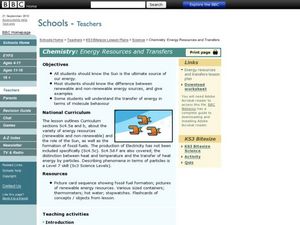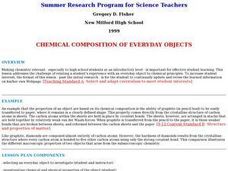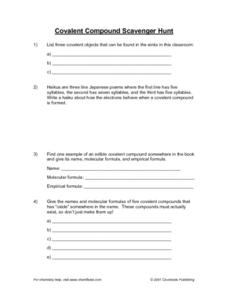Curated OER
What Contains Carbon?
Young scholars explore elements by analyzing everyday objects and materials in class. In this carbon lesson, students define several vocabulary terms such as carbon dioxide, hydrocarbon, and carbonate. Young scholars view a group of...
Curated OER
Creating an Enzyme-Substrate Model
Young scholars explore the reaction rates of an enzyme-mediated reaction through experimentation. In small groups, they use everyday objects to demonstrate the effects of environmental variables on enzyme function.
Students graph and...
Curated OER
Chemistry: Energy Resources and Transfers
Students explore the concepts of energy resources and energy transfers. In this chemistry instructional activity, students examine renewable and non-renewable energy sources as they view classroom demonstrations and discuss the concepts...
Curated OER
Chemical Composition of Everyday Objects
Students relate chemistry to an object they use everyday. They research information related to chemistry and create their own webpage. They are to keep their page up to date as new observations are taken.
Curated OER
Poster Assignment: Sports Chemistry
Tenth graders distinguish between chemical and physical properties and changes in matter when given specific examples. They view a video of sports activities. Students chose their favorite sport and design an experiment to improve sports...
Curated OER
Covalent Compound Scavenger Hunt
In this chemistry worksheet, students look for the covalent compounds while examining the objects in the classroom. They also apply the knowledge of formulas.
Curated OER
Eggs'ceptional Experiments
Students see evidence of chemical reaction and follow the scientific method to hypothesize, observe, and reach conclusions. They conduct a series of egg based experiments such as forming crystals and complete journal activities as a...
Institute of Electrical and Electronics Engineers
Can You Copperplate?
Introduce emerging engineers to the process of metal plating. This resource provides background reading on chemical engineering, plating, and corrosion. It concludes with a copper plating activity. The standards alignment list includes...
Curated OER
An Introduction to Acids and Bases
Students explore acids and bases. In this lesson about acids and bases, students do an experiment to test certain items to determine what they are. Students use cabbage and litmus paper as indicators. Students understand how to sort the...
Curated OER
Nanaotechnology: Small Science, BIG DEAL!
Students read an article that introduces them to the science and applications of nanotechnology. They discuss the the everyday examples of how nanotechnology is and can be used. In small groups, they observe and make inferences about...
Curated OER
Planetary Diversity
Students explore the infrared radiation and the part of the spectrum that is not always visible. In this electromagnetic lesson students complete a lab activity on the different wavelengths.
Curated OER
Gas Laws and Alka-Seltzer Rockets
Students investigate the Ideal Gas Law. In this three states of matter lesson, students create Alka-Seltzer rockets using film canisters. Students record observations and data according to the scientific method and explain the gas...
Curated OER
Things That Glow: From Fireflies to Quantum Dots
Third graders observe light energy. In this heat and energy lesson, 3rd graders will study the concept of light as a form of energy. Students will examine the different forms of light and the type of energy it produces.
Curated OER
How Small Can You Cut?
Students explore quarks, the smallest particles known. They follow a table to determine how many paper cuts they would have to make to get down to the size of a quark. They cut a paper strip in half as many times as they possibly can...















